- Home
- Nick Carter
Earthfire North Page 6
Earthfire North Read online
Page 6
"I was asked to leave Iceland, sir."
"So I've heard," Hawk said gruffly. "Any explanation, or do I have to guess?
"I stepped on some toes."
"Sensitive toes?"
"Yes, sir. I think Lydia Coatsworth stepped on the same toes and was killed for it."
"You were in Iceland as a private citizen, is that not so? You had no assignment from me, no backup, no license. You were completely on your own."
"Yes, sir»
Hawk shook his head. Nick could see that the anger was smoldering in him. "What the hell am I supposed to do? You've survived a long time in this business."
"Yes, sir?"
"I should think long enough to know that you are not licensed to act as a private citizen because of the constant risk of exposure. When you're on duty, and something goes sour, this office covers for you. Governments are mollified, police officials cooled down, cover stories strung out. You are given almost unlimited freedom on your assignments, but only at a great cost and with the understanding that on your off-duty time you're not on privilege."
"I know…"
"When you play games with that backup, you leave us wide open. Carter. Questions are asked, murder investigations begun… almost impossible to cover because there was no chance to prepare for these contingencies in advance. I know you understand this, but it needs to be repeated anyway."
"There were mitigating circumstances," Carter said. Hawk was absolutely correct, of course, but he just couldn't let this go.
Hawk sat back in his chair with a sigh. "I'm willing to listen."
Carter related the story to Hawk just as he had told it to Captain Einarsson and Lieutenant Thorsson before him, except this time no details were left out. He centered his narrative around his suspicions of Thorstein Josepsson, the Althing member with a taste for money and power who, as a former head of the Icelandic Internal Energy Commission, would have the knowledge to run such an operation as Lydia had apparently discovered. He explained Josepsson's position on the commission and how he had lobbied for nuclear power.
Carter added that if he'd had the time, he was sure he could have found financial connections between Josepsson and the contractors who would have done the actual work on whatever machinery was tapping the geothermal energy. Carter was about to go on, pointing out that it was Josepsson who had engineered his ouster from Iceland, when Hawk raised a hand to stop him.
"What you've told me so far is nothing more than a local problem…"
"If I may interrupt, sir," Carter said, "there is something else."
"Important?"
"Yes, sir."
"Go on."
"Just before I left, I spoke with the police captain in Akureyri. My assailant, Victor Hauptmann, was identified as an Argentinian hit man with a long history of rightist politics. He'd participated in assassinations in Chile, Paraguay, and El Salvador to name a few. A real pro. He had a cyanide capsule implanted beneath the skin of his arm."
Hawk's attitude changed noticeably. He sat forward and tapped the ash from his cigar. "I haven't heard that used since the war. Strange it should crop up now. Like this."
"I have a feeling Josepsson is fronting for someone else. His people break into my hotel room and cut up my clothes. Eventually they even engineer my persona non grata status. But whoever Josepsson fronts for plays rougher. They killed Lydia and tried with me. Without that explanation, or something like it, Josepsson's actions seem too erratic."
Hawk nodded in agreement.
The obvious question," Carter went on, "is who? It may be someone interested in establishing a nuclear plant in Iceland and who is not above importing muscle from a long ways off to keep their secrets secret."
"Argentina?"
Nick nodded.
"You want this as an assignment?"
"Yes, sir," Carter said, relieved. "I think I've discovered something important. But if it turns out to be nothing more than a local flap, we can turn what we have over to the local authorities. I know at least one of them who is straight." Carter hesitated a moment. "But I think there's more to it than that, sir. I mink it's international."
Hawk turned and gazed momentarily out the window, his brow knitted. "All right." he said finally. "You know the procedure. I want a complete written report with budget estimates, the works. I'll get Stransky to help you with the figures…"
"Begging your pardon, sir, but there really isn't time for that. The trail in Argentina is already getting cold."
Hawk sighed. "Skip the paperwork. Give what you have to Mary, and I'll have Stransky work it up. We'll get the team on it."
"Thank you, sir," Carter said, getting to his feet.
"Do what you have to do. No sense going about this half-assed. But be careful, please."
In the outer office Carter gave Mary the complete rundown on everything that had happened in Iceland. When it was all down on tape, he pecked her on the cheek and left.
The rain had stopped, but the afternoon was chilly. He climbed into his car, drove quickly home, and packed his suitcase. When he was ready he called a cab for the airport.
His flight had left Washington at 6:00 p.m., and twelve hours later he was watching the sun rise over the Rio de la Plata as the vast sprawl of greater Buenos Aires came into view through the ragged clouds.
He had no real idea what he would find here, but he knew that he could not let this go. He kept seeing Lydia's note in his mind's eye. He kept seeing her against the bleak backdrop of Iceland.
The plane dipped south and rumbled to a landing at Ezeiza Airport about thirty miles from the city. Carter deplaned, was passed through customs with no problem, and caught the airport bus into the metropolitan area.
Ever since the Falkland Island war with Britain, the situation here was strained at best. He could see it on the faces of the other passengers, and he kept to himself for the long ride. What he didn't need at this moment was any kind of a stupid incident.
It took nearly forty-five minutes before he got downtown to the Sheraton. He checked in, went upstairs, and when he was cleaned up from the trip, ordered breakfast from room service. Next, he telephoned Juan Mendoza, who was AXE's chief of station here. His cover was political editor for La Nacion, and in fact he was one of the most politically knowledgeable men in Argentina.
But Carter had forgotten that business in Buenos Aires rarely begins before ten, and even though it was an hour later here than in Washington, for Argentinians it was still early. Mendoza's wife answered with a few mumbled words thickened with sleep. But Carter's urgent tone brought her awake. Juan was indisposed at the moment, but she promised to have him telephone the hotel immediately.
Room service arrived with his breakfast, and the waiter set the cart by the floor-to-ceiling window where Carter could watch the city come to life. When he was alone he pulled two file folders from his suitcase, poured himself a cup of thick, black coffee, and began to read.
The first was the Interpol file on Victor Hauptmann, and it covered essentially the same ground Einarsson had covered earlier, only in greater detail, with definite dates and places.
The second file was the AXE computer printout of all the reports from other agencies — the CIA, the French SDECE, and the British SIS — on Hauptmann. Most of it consisted of material filed by intelligence agency stations in Bolivia, Uruguay, Venezuela, Panama, and Chile.
On one of the back pages, reference was made to a Paraguay school for assassination. It was a jungle camp run by members of certain security forces and was designed to teach the art of political murder to any with the money to pay for it. The school was reportedly Cuban-staffed and backed. Hauptmann had apparently attended the school in 69 and 70, and Carter noted with some satisfaction that the encoding for his own career dossier was included in the "see also" listing at the bottom of the page. He remembered the place well. In 78 he had put it out of commission.
Carter was about to pour his third cup of coffee when Mendoza called. He was mildly sarcast
ic about how nice it was to hear from a man he hadn't seen in two years at practically the crack of dawn, and the two of them traded friendly banter for a few minutes. They had worked together once before on the Venezuelan oil pipeline, having discovered a plot to sabotage it. Ever since that time they had been friends.
"What brings you here, my friend? Business?" Mendoza finally asked. "I didn't see it on the wire."
"Business," Carter said. "Victor Hauptmann. The name ring a bell?"
"You've been traveling in some tough circles if you've been near him, amigo. The local toughs call him 'the exterminator'." A very bad man but the best there is for certain types of work."
"Who can afford him lately? Any rumblings?"
"Nothing. It would be doubtful he's working for anyone local. He lives here. He'll keep his nose clean in his own backyard."
"It would be someone with an interest in Iceland."
"Iceland? Are you kidding? What possible connection could there be between Argentina and Iceland? Most of Argentina hasn't heard of the place, much less even know where it is. We've got problems enough with the Maldivas without taking on another island."
"I killed Hauptmann two days ago in a lava field a hundred miles south of the Arctic Circle. The files say he was Argentinian. Someone here must know what he's been up to lately — who he might have been working for.
Mendoza took a while to answer. "It's too bad your boy isn't a Red," he said finally. "We've got Russians crawling all over the place down here. But when it comes to the extreme right, our info is definitely thin."
"I have files on him thick enough to choke a horse, Juan. But not a damn thing on his activities for the past few years. He seemed to have dropped out of sight. And for a man like Hauptmann, that doesn't mean retirement."
"The local police have no love lost for Hauptmann and his kind. They might be able to help."
"Anything else?" Carter asked, somewhat disappointed.
"There is one other source you might try. A kid named José Braga. They say he's phenomenal. A walking computer. He's with the Committee for a Free Argentina, one of our local groups. They keep tabs on all the right-wingers this side of the equator, and Braga keeps it all in his head."
"Too dangerous to keep files?"
"That's what I'm told. This Braga has total recall. If anyone might know where Hauptmann has been and what company he's been keeping, Braga would."
"Where do I find him?"
"That's the hard part. Right now the Committee is on the run. A little mishap with a bomb at a meeting of the conservative party. They're wanted pretty badly just at this moment."
"How do I get to Braga?"
"You might try a priest at St. Dominic's. Father Wilfredo. He's been their spokesman in the past. He hasn't spoken with the police of course, but if you say the right things he might arrange a meeting."
"Thanks."
"Best of luck, amigo. You're going to need it with that crowd. The Argentinian Federal Police are very good, and they've had no luck."
"Carter hung up, but only after Mendoza had extracted a promise from him to come out for dinner sometime soon. There was no offer of help. It was AXE policy; agents were to have a certain autonomy unless they requested help or clearly needed it. Juan had just been doing his job.
Using information from the AXE background file, Carter contacted the CIA liaison in the Argentinian Federal Police, a Captain Vargas. Using Vargas's cryptonymn, he asked that any information about Victor Hauptmann be sent to his room at the Sheraton. Vargas, of course, thought Carter was CIA and agreed to do it. Carter didn't like to step on interservice toes this way, but he did not want to go through a lot of lengthy explanations at the moment. If the kid Mendoza had mentioned could not be found, he was evidently good. If the waters got too muddied around Carter, Braga might go deeper.
While he was waiting, Carter took a leisurely shower and shaved. He was just finishing putting on a sport jacket to hide Wilhelmina nestled under his arm, when he heard a knock at the door. He opened it to find a well-groomed young man in a crisp uniform standing in the corridor. He handed Carter a fat manila envelope, saluted stiffly, and left.
Vargas had worked very fast. Incredibly fast, as a matter of fact.
Carter brought the envelope over to the window where he sat down and took out the file folder stuffed with papers. It was an old file, however, its information no more up-to-date than the things he already had. It was disappointing. The federales, it seemed, knew even less about Hauptmann than Washington did, although he did uncover one interesting fact.
Hauptmann's mother had been Argentinian, but his father had been German. His father had come here just after the war and had set up a small printing business. The business had failed, there had been a divorce, and the father had eventually returned to Germany. He knew all that. What was new was that apparently Hauptmann's father had been an officer in the SS. The notation after the name was nothing more than the two letters, faded now with time, and yet it was something Washington did not have.
Carter closed the file and put it with the others in his suitcase. Then he went out, locking the door behind him. Outside he caught a cab.
* * *
St. Dominic's was a small church that looked as though it had seen better times. The pink stucco had fallen from the bricks in several places, and its plain wooden door looked well worn. But the sign in front was freshly painted, and as Carter's cab pulled up and he got out, the bells were ringing out the hour.
The church was located in the western end of the city, nestled in with the villas miserias — cities of misery — the slums made up of corrugated cardboard, tin, and plywood shanties pushed together in an incredible jumble. A group of filthy dirty, ragged children begging for coins surrounded Carter as he stepped from the cab. Norteamericanos were very rare in this part of the city. He took the change from his cab fare, added a few pesos, and distributed it among them. Then he went inside.
At the altar a man was lighting candles. Carter walked down the aisle and, when the priest was finished, cleared his throat.
"Father Wilfredo?"
The old man turned around. The sagging, lined flesh of his face bunched around his eyes as he squinted at Carter in the near darkness. "Yes, my son?"
"I would like to speak with you. Father, if I may. It is something of very great importance," Carter said in Spanish.
"Momento, por favor," Father Wilfredo said. "Please sit down. I will be finished in a moment."
The priest turned back to his candles, and Carter took a seat in the first row of pews. He waited until the priest had lit all the candles, then several more minutes while the man knelt in front of the crucifix and prayed.
Slowly the old man got up, shuffled to the vestry to the left of the altar, and a few minutes later reappeared wearing street clothes and a clerical collar. He eased himself into the pew next to Carter.
"And now, what may I do for you?"
"I am looking for a young man. Father. José Braga. I was told you might be able to help."
The smile left the old man's face. "There are many looking for José. Half of Argentina would like to find him. Why do you want to see him? You are American?"
Carter nodded. "I want to speak with him because he might have knowledge of a man I'm looking for. A man who is a hired killer."
The priest looked at him closely.
"I would be willing to pay well."
The priest sighed. "He needs money. There is so little food. If you can be trusted. Who is this man you seek?"
"Victor Hauptmann. I must know where he has been, who he has been working for, and what he has been doing for the past year. The information is worth a lot to me. Perhaps as much as one thousand dollars."
The old eyes looked at him uncertainly. "If I deliver your message, what would stop you from telling the police?"
"I am not from the police. I have no interest in them nor in what they think José Braga might be involved in. Victor Hauptmann tried to kill me s
everal days ago. I have reason to believe he killed a very good friend of mine. A woman. I want to know why. I want to know who he is working for. Carter took out two hundred-dollar bills and handed them over. "One is for José, and one is for the church. There will be more when I have spoken with him."
Father Wilfredo glanced doubtfully at the money in his hand.
"I will meet him anywhere at any time. He can pick the place. And I will come alone."
Father Wilfredo looked Carter directly in the eye, weighed the alternatives for a moment, then put the money in his jacket pocket. "Come back after the eleven o'clock mass," he said.
* * *
It was a few minutes after noon when the last of the few parishioners had cleared the church. Carter came forward. The old priest said nothing. He turned and walked toward the rear of the building. Carter followed.
They went through a narrow door concealed in the wood paneling behind the altar, into an ill-lit hall, and finally into a tiny room at the back. Floor-to-ceiling bookcases jammed with papers and books covered three of the walls. A battered, ancient armchair and footstool stood to one side, and in the center of the bare, tiled floor was set a squat, ornate wooden desk. Perched upon the desk as though he too were a part of the furnishings was a slight, dark boy in threadbare cotton trousers and shirt. On his upper lip was a very thin mustache. He looked like any other Argentinian teenager except that across the bridge of his nose rested a pair of thick glasses that enlarged his eyes, giving him a vaguely owlish appearance.
"José Braga?" Carter asked.
The boy nodded, watching Carter suspiciously. The priest walked behind the boy and put his hand protectively on his shoulder.
"The money," Braga demanded.
Carter pulled out nine one-hundred-dollar bills and handed them to the boy who looked at them, then handed the money to the priest.
"You have just saved the lives of my comrades in arms, and you have prolonged the valiant struggle of the Argentinian people against the oppression of its cruel imperialist government,"

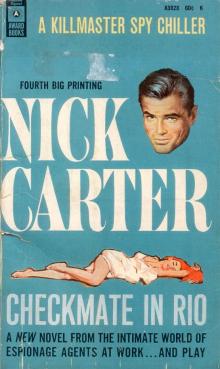 Checkmate in Rio
Checkmate in Rio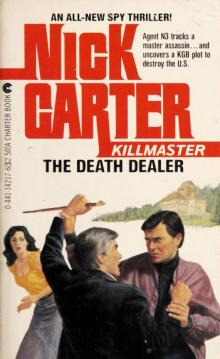 The Death Dealer
The Death Dealer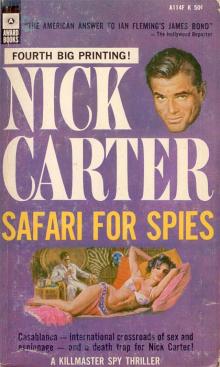 Safari for Spies
Safari for Spies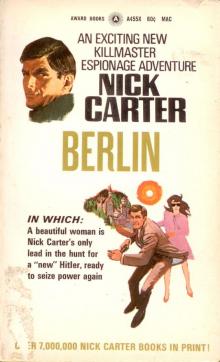 Berlin
Berlin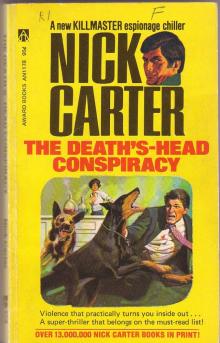 The Death’s Head Conspiracy
The Death’s Head Conspiracy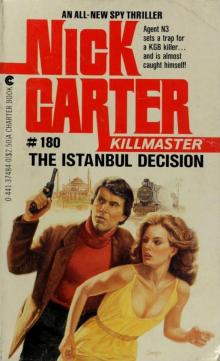 The Istanbul Decision
The Istanbul Decision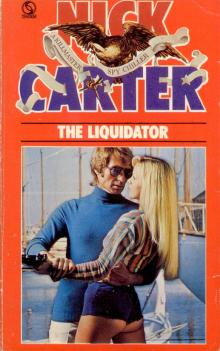 The Liquidator
The Liquidator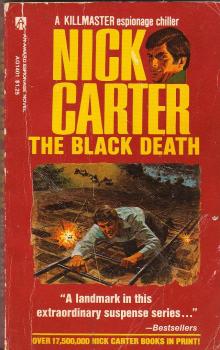 The Black Death
The Black Death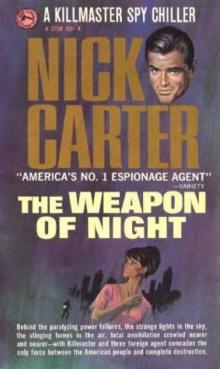 The Weapon of Night
The Weapon of Night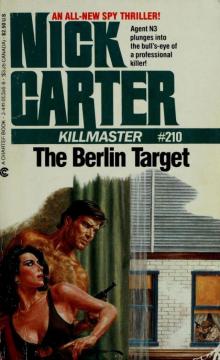 The Berlin Target
The Berlin Target Temple of Fear
Temple of Fear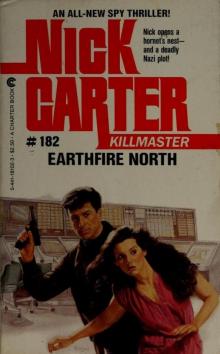 Earthfire North
Earthfire North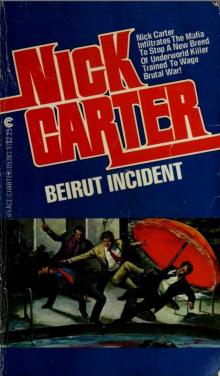 Beirut Incident
Beirut Incident White Death
White Death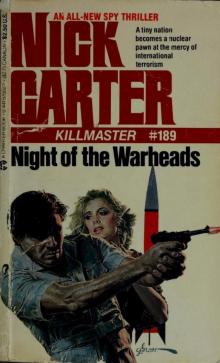 Night of the Warheads
Night of the Warheads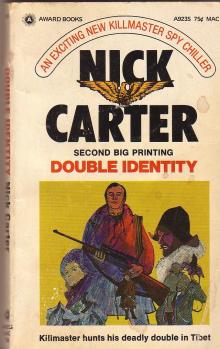 Double Identity
Double Identity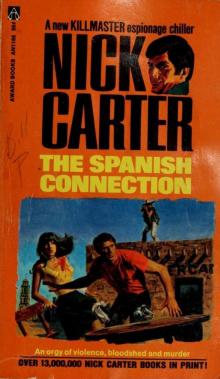 The Spanish Connection
The Spanish Connection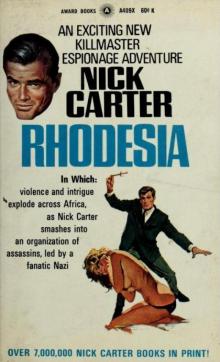 Rhodesia
Rhodesia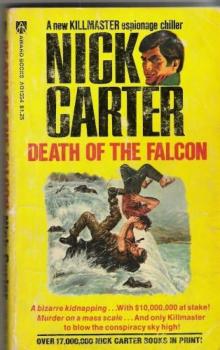 Death of the Falcon
Death of the Falcon The Executioners
The Executioners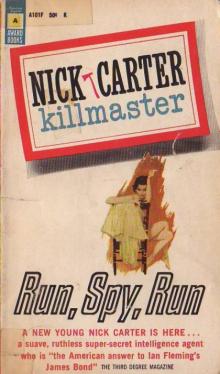 Run, Spy, Run
Run, Spy, Run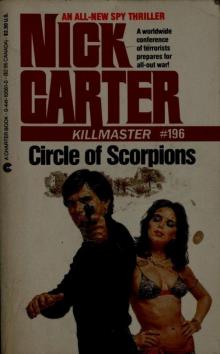 Circle of Scorpions
Circle of Scorpions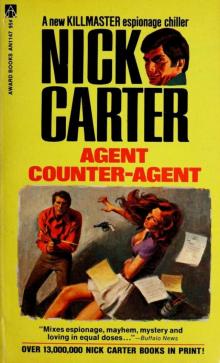 Agent Counter-Agent
Agent Counter-Agent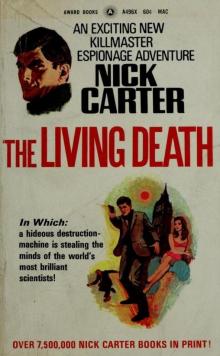 The Living Death
The Living Death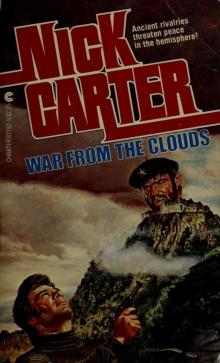 War From The Clouds
War From The Clouds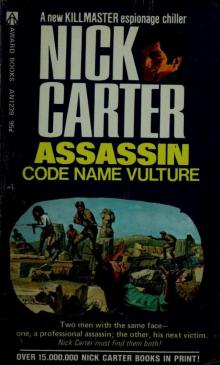 Assassin: Code Name Vulture
Assassin: Code Name Vulture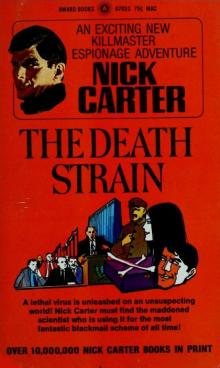 The Death Strain
The Death Strain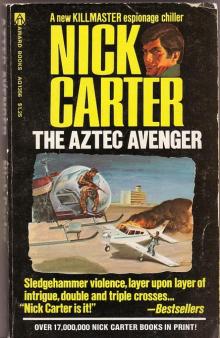 The Aztec Avenger
The Aztec Avenger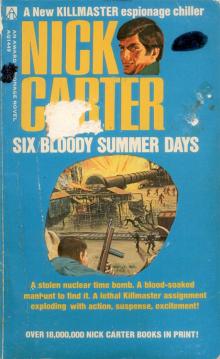 Six Bloody Summer Days
Six Bloody Summer Days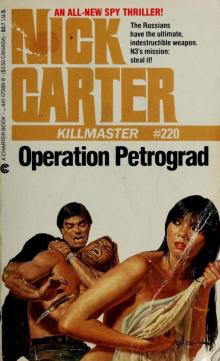 Operation Petrograd
Operation Petrograd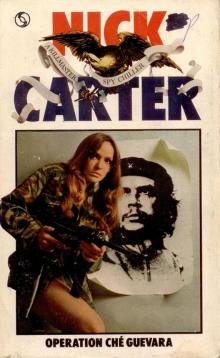 Operation Che Guevara
Operation Che Guevara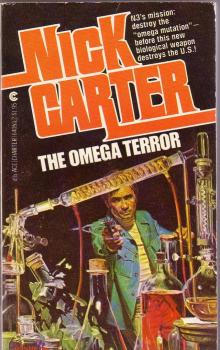 The Omega Terror
The Omega Terror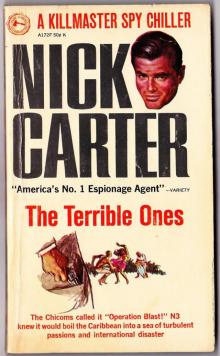 The Terrible Ones
The Terrible Ones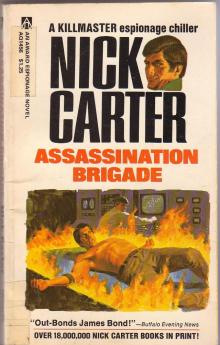 Assassination Brigade
Assassination Brigade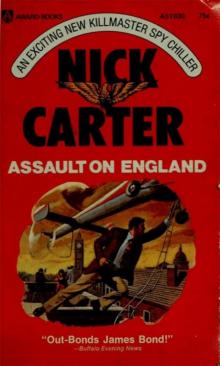 Assault on England
Assault on England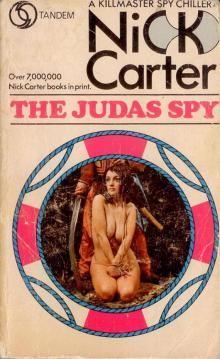 The Judas Spy
The Judas Spy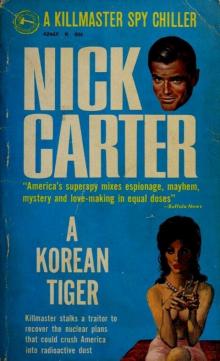 A Korean Tiger
A Korean Tiger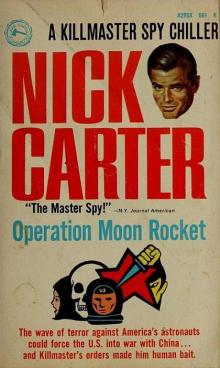 Operation Moon Rocket
Operation Moon Rocket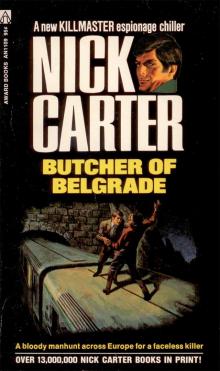 Butcher of Belgrade
Butcher of Belgrade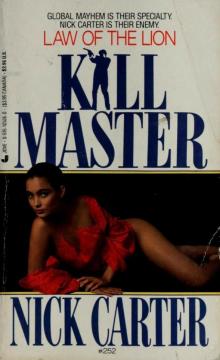 Law of the Lion
Law of the Lion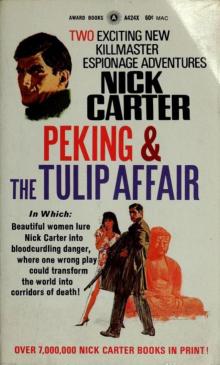 Peking & The Tulip Affair
Peking & The Tulip Affair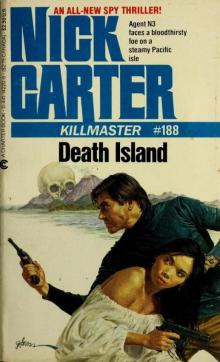 Death Island
Death Island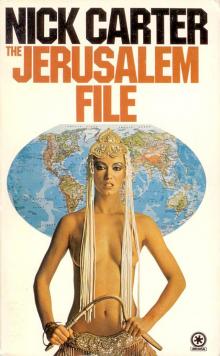 The Jerusalem File
The Jerusalem File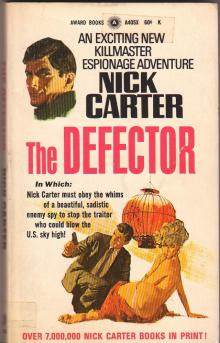 The Defector
The Defector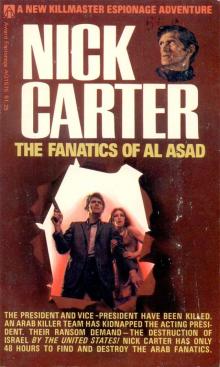 The Fanatics of Al Asad
The Fanatics of Al Asad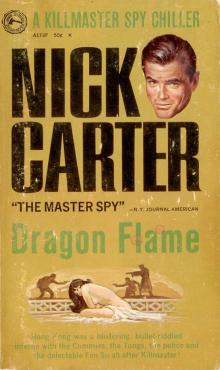 Dragon Flame
Dragon Flame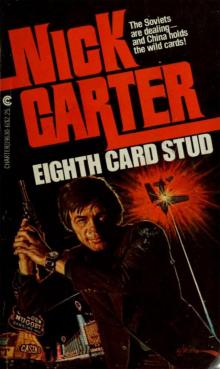 Eighth Card Stud
Eighth Card Stud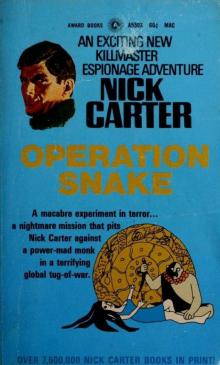 Operation Snake
Operation Snake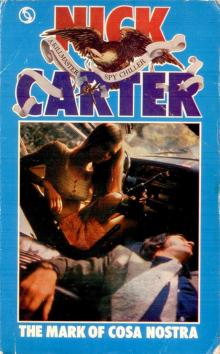 The Mark of Cosa Nostra
The Mark of Cosa Nostra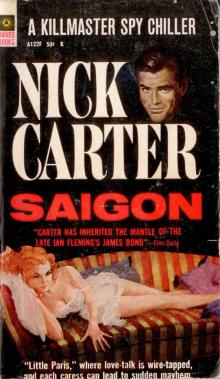 Saigon
Saigon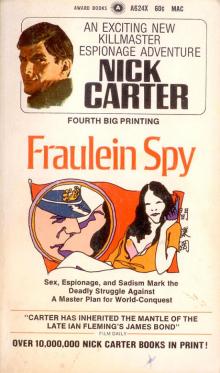 Fraulein Spy
Fraulein Spy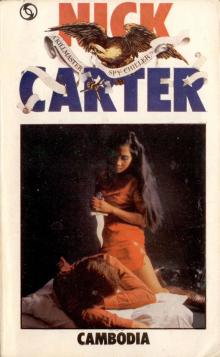 Cambodia
Cambodia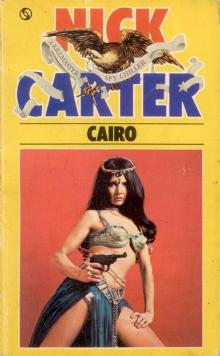 Cairo
Cairo